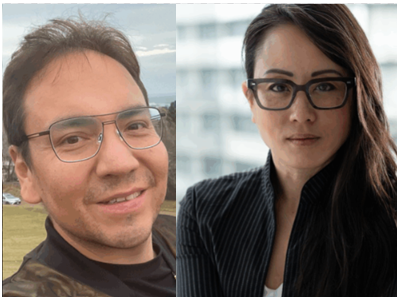Braiding Indigenous Knowledges into Brain Health Research: A Holistic Perspective
Author(s):
Mamaateshiins (Andrew Manitowabi)
Jennie Z. Young

Disclaimer: The French version of this text has been auto-translated and has not been approved by the author.
Canada’s current approaches to brain health and mental wellness faces critical gaps that hinder our ability to fully understand and address these complex issues. Indigenous Knowledges, with their rich, holistic and deeply interconnected views of health, offer transformative potential for brain health research. As society increasingly recognizes the value of Indigenous Knowledges, it’s clear that embracing these ways of knowing in health and medicine isn’t just about equity – it’s essential for improving our research practices and health outcomes for all.
The Canadian Brain Research Strategy (CBRS) is leading a national effort to reimagine our approach to brain research and health as a country. In adopting a holistic perspective, we recognize Indigenous Knowledges as a vital and integral component of this transformation. Embracing these knowledge systems allows us to develop more effective and comprehensive strategies for brain health and research, while also advancing the critical work of decolonizing health and research practices
The Intersection of Indigenous Knowledges and Brain Health Research
Indigenous knowledge systems have evolved over millennia, deeply rooted in observation, experience, and spiritual connection to the land, people, and creation. Although these systems differ across communities and nations, they broadly share a holistic understanding of health—one that connects physical, mental, emotional, and spiritual well-being in ways Western medicine often overlooks. In this worldview, health isn’t just about the individual; it’s about relationships with family, community, ancestors, and the natural world.
This holistic approach is especially relevant to brain health and research. We now know that looking solely at biological factors doesn’t give us the full picture. Social determinants—like air quality, housing, access to healthcare, and education—play a significant role in mental wellness. Research shows that time spent in nature improves cognitive function and reduces stress, anxiety, and depression. On the flip side, environmental disruptions and climate change can trigger stress, anxiety, and trauma, reminding us that brain health is deeply connected to ecological health.
By braiding Indigenous perspectives with Western scientific methods, we can gain a fuller understanding of brain health that encompasses everything from molecular processes to societal influences. This transdisciplinary holistic approach opens up new avenues for thinking about prevention, diagnosis, and treatment of brain-related conditions, leading to research that is both more inclusive and impactful.
Two-Eyed Seeing Through Compound Eyes: Bridging, braiding, and weaving Indigenous and Western approaches in research
Guided by our Indigenous Knowledge Holders Group, the CBRS has prioritized consulting with diverse Indigenous stakeholders since the inception of our national research strategy for brain and mental health.
These efforts culminated in the “Two-Eyed Seeing Through Compound Eyes Workshop” in January 2024 In the lead-up to this event, we engaged a diverse range of stakeholders, including Indigenous Traditional Knowledge Holders, Indigenous scholars at all career stages, brain researchers, heads of Indigenous research organizations, health administrators, community representatives, and research funding organizations. Through a series of sessions and meetings held between July 2022 and May 2023, these discussions fostered cross-cultural dialogue and collaboration. The workshop itself brought together more than 120 participants from various sectors, culminating in actionable solutions for advancing brain health research with Indigenous Peoples.
Pathways to Indigenous-centred research collaboration
Based on our consultations and workshop, we offer the following key recommendations for creating meaningful partnerships in brain research:
- Collaborative Research Models: Embrace research models that are collaborative and participatory, involving Indigenous communities as equal partners from the start. These models should allow for flexibility in project design and implementation.
- Ethical Considerations: Respect Indigenous sovereignty, knowledge ownership, and cultural protocols by ensuring research partnerships align with Indigenous values.
- Methodological Innovations: Utilize innovative research methodologies that integrate qualitative and quantitative methods, storytelling, and community-based participatory research approaches.
- Capacity Building: Build research capacity within Indigenous communities, including training and supporting Indigenous researchers and scholars.
- Parallel paths: Respect multiple knowledge systems by acknowledging Indigenous Peoples as rights holders, accomplished experts, and key decision-makers. The goal may not necessarily be to blend knowledges but to walk alongside one another, supporting and learning together.
Empowering stakeholders to move from vision to action
The future of brain research in Canada hinges on our collective action. To transition from vision to action, we must empower stakeholders across all sectors in advancing Indigenous health research. The following targeted recommendations are designed to address systemic barriers and foster meaningful progress:
- Researchers: Engage respectfully and collaboratively with Indigenous communities from the outset to build relationships early in the research process and adopt methodologies that honour and embraces Indigenous Knowledges.
- Policymakers: Establish supportive frameworks that recognize and legitimize Indigenous Knowledges within health research and practice, creating space for these perspectives in decision-making.
- Academic Institutions: Embrace Indigenous perspectives into curricula and training programs for health professionals and researchers, equipping future generations with the tools to bridge Indigenous and Western knowledge systems.
- Funding Bodies: Dedicate long-term funding streams to Indigenous-led or partnered research. Prioritize building enduring relationships to enable allocating funds in good faith. Consider partnerships beyond government, including private and philanthropic organizations, to ensure sustainability.
A genuinely holistic approach to brain health—one that honors Indigenous Knowledges and braids them with Western science—offers the best chance of advancing our understanding and improving health outcomes for all Canadians. Recognizing Indigenous Knowledges in brain health research is a critical and promising step forward.
The level of engagement we’ve seen throughout these consultations and workshops reflects a shared commitment to conducting this work in a meaningful and respectful way. These efforts have been foundational to the development of Canada’s national brain research strategy and will remain central to its implementation.
The future of brain research and health is brighter when we work together.
More on the Author(s)
Mamaateshiins (Andrew Manitowabi)
Canadian Brain Research Strategy
Indigenous Initiatives Lead
Jennie Z. Young
Canadian Brain Research Strategy
Executive Director

